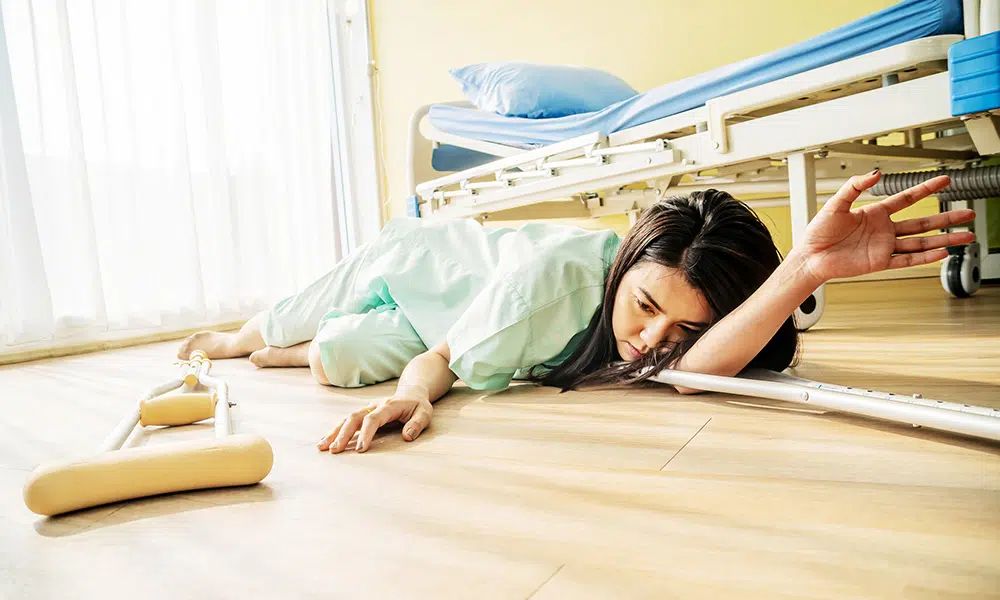Falling is one of the most common threats to hospital patients, especially those who are elderly, weak or confused. The U.S. Agency for Healthcare Research and Quality estimates that 700,000 to 1 million patients experience clinical harm due to in-hospital falls each year, and more than one-third of them result in injury, including bone fractures, head trauma and other potentially life-threatening injuries. Even among hospital patients who are not seriously injured from their falls, the psychological damage associated with fear can have lasting detrimental effects on their overall health.
The Joint Commission reports that falls with serious injury are consistently among the top 10 sentinel events reported in their Sentinel Event database. Patients injured from these falls typically need additional treatment and sometimes have prolonged hospital stays. Sadly, close to 63 percent of them die as a result of their fall injuries.
If you or a loved one has been seriously injured from a hospital fall, you may be wondering if you can get compensated for fall-related medical expenses, pain, suffering, mental distress and other damages. In this blog post, I will address this issue, elucidating the conditions under which you can sue for Florida medical malpractice associated with an in-hospital fall to get compensated for the damages you have suffered.
What Causes Patient Falls in Hospitals?
The Joint Commission has identified six factors that contribute to patients falling:
- Inadequate assessment
- Communication failures
- Lack of adherence to protocols and safety practices
- Inadequate staff orientation, supervision, staffing levels or skill mix
- Deficiencies in the physical environment
- Lack of leadership
Any of these factors, or a combination of them, can lead to conditions in which a patient is more likely to fall; however, it is typically the patient’s condition itself which causes the fall. For example, if patients’ alertness, strength, coordination or balance is not adequately assessed, they might not be monitored closely enough and could fall out of bed or when attempting to walk on their own. Similarly, if information about patients’ weakened mental or physical condition is not properly communicated to the health care providers responsible for direct patient care, they might not provide the level of care necessary to prevent falls.
While there are many reasons a patient might fall, determining if a fall and resulting injuries are a result of medical malpractice can be very difficult. Talking with an experienced Florida medical malpractice attorney about the circumstances surrounding the fall and the resulting injuries is critical for understanding if a case is viable under the Florida medical malpractice statute. It is also critical to note that when the Florida medical malpractice rules apply, if a Plaintiff does not strictly comply with these hyper-technical rules (involving shortened time frames to sue, the need for presuit expert affidavits, and strict adherence to many other legal provisions), the injured person’s case can be permanently dismissed or thrown out of court.
When Are Florida Hospital Patient Fall Injuries Due to Medical Malpractice?
When hospital patients fall and suffer injuries, their case can only be considered medical malpractice if there is sufficient evidence demonstrating the four elements of medical negligence: the health care provider(s) responsible for the fall owed the injured patient a duty of care; the health care provider(s) breached the duty of care; the breach caused the fall; and, as a result of the fall, the patient suffered damages, such as financial losses, pain, suffering and mental distress.
In other words, for a fall to be considered the result of medical malpractice, a doctor, other health care provider or health care facility responsible for treating or caring for the injured patient has to have provided care or treatment that was below the level of care accepted as standard by other reasonably prudent health care providers practicing in the same field of medicine. Moreover, that sub-standard care had to have caused the patient to fall and suffer injuries.
Some examples of sub-standard care, or medical malpractice, that can result in hospital patients falling are:
- Diagnostic errors – If a doctor does not correctly diagnose a stroke or head injury, for example, and a patient has limited mobility, is in a weakened condition or is in a state of confusion, the patient could be left unattended or put in a bed without guard rails at the hospital and then fall and injure himself as a result.
- Medication errors – If an incorrect medication, incorrect dosage of a drug or unsafe combination of drugs were prescribed and/or administered to a hospital patient, the patient could become weak, confused or dizzy and fall as a result.
- Assessment/monitoring errors – If a patient’s condition is not assessed correctly or thoroughly by hospital personnel and factors that make him susceptible to falling, such as old age, arthritis, nerve damage, orthopedic injury or dehydration, are not noted, then hospital staff may not take the recommended steps to prevent a fall. Patients who are frail, confused or light-headed might then fall and injure themselves.
When Are Hospital Patients’ Falls Due to Ordinary Negligence Rather Than Medical Malpractice?
If a patient’s fall occurs because of unsafe conditions at the hospital, such as a slippery floor, an obstacle left in a hallway, or a broken stair, rather than because of sub-standard (negligent) medical care or errors, then the fall could be the result of ordinary negligence. These cases, in which a fall is not related to the patient’s medical condition or treatment, are premises liability cases rather than medical malpractice.
In premises liability cases, you must establish that the property owners/managers neglected their duty to maintain their property and keep it reasonably safe from hazards. Then you have to demonstrate that their negligence led to an unsafe condition that resulted in the patient’s falling and suffering injuries. Unlike a medical malpractice claim, you would not have to prove that a health care provider was negligent or made an error that caused the fall.
Do I Need an Attorney for a Hospital Fall Medical Malpractice Lawsuit in Florida?
As the foregoing discussion suggests, determining if you have a viable medical malpractice case and then collecting the evidence necessary to bring a claim against a healthcare provider and/or facility can be a complex process. To prove that a doctor or other health care provider breached the accepted standard of care and caused your fall injuries requires extensive investigation and a comprehensive understanding of the facts of your case, as well as expert testimony regarding the standard of care and the cause of your injuries.
In short, you need an experienced, top quality Florida medical malpractice attorney with the skill and resources necessary for winning your case. The team of highly experienced, skilled litigators and investigators of Boyers Law Group has for many years enabled our clients to achieve large, often multi-million-dollar recoveries in their medical malpractice cases and will do everything possible to maximize your prospects of achieving full and just compensation for your hospital fall injuries.
Call Boyers Law Group or submit the “Tell Us What Happened” from on our website to discuss your Florida medical malpractice case with us free of charge.

